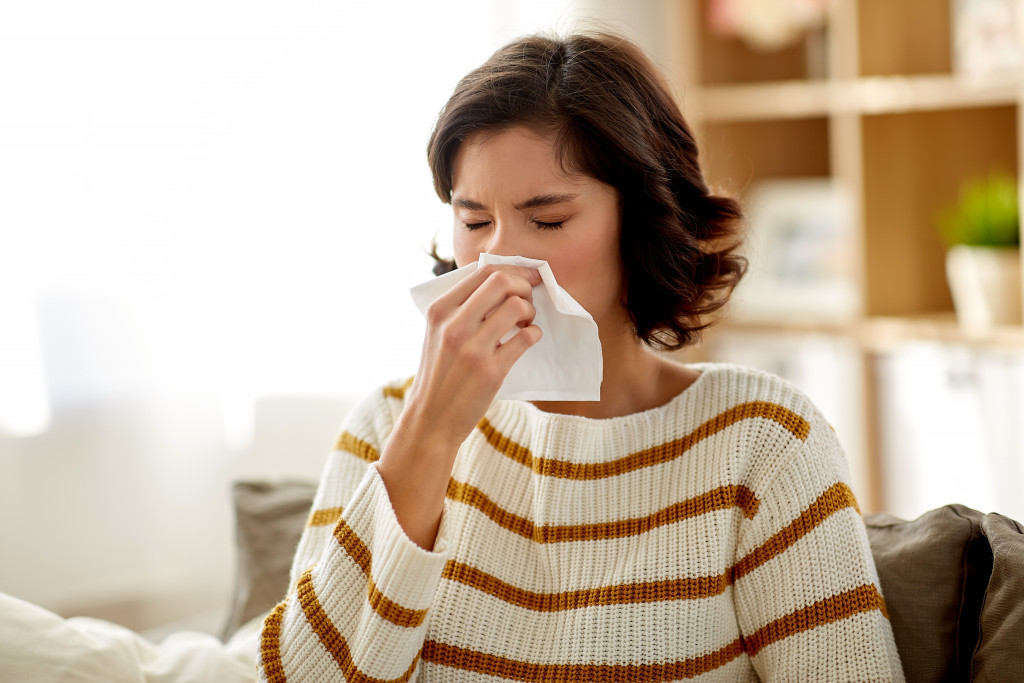Allergies are a common problem, affecting millions of people worldwide. The common symptoms of allergies include coughing, sneezing, nasal congestion, runny nose, itchy and watery eyes, hives, and swelling. While many pharmaceutical options are available, many people prefer to treat their allergies with supplements. Here are the top five supplements to try to relieve your allergy symptoms.
Vitamin C
Vitamin C is a well-known immunity booster, but did you know it can also help relieve allergy symptoms? Vitamin C helps reduce histamine levels in the body, which causes a runny nose, watery eyes, and sneezing associated with allergies. This is due to its ability to act as an antihistamine and block the action of certain inflammatory enzymes. You can find Vitamin C in citrus fruits, dark leafy greens, bell peppers, and broccoli. You can also take it in supplement form. Just be sure not to exceed 2000mg daily, as too much Vitamin C can cause gastrointestinal upset.
Quercetin
Quercetin is a bioflavonoid that inhibits histamine release. It’s often used as an alternative to antihistamines. This supplement acts as an anti-inflammatory, helping reduce the reaction’s severity. Quercetin is found in many fruits and vegetables, including onions, apples, kale, and tomatoes. You can also find it in supplement form with a recommended daily dose of 500-1000mg.
Butterbur
Butterbur is a plant that has been used for centuries to treat various conditions, including allergies. Studies have shown that it can help reduce sneezing, congestion, and other allergy symptoms. Butterbur works by inhibiting leukotrienes, which are compounds that contribute to inflammation. A review of 16 studies found that butterbur was effective at reducing hay fever symptoms like runny nose, sneezing, and itchy eyes. The recommended dose is 50mg twice daily. It’s important to note that butterbur should not be taken by pregnant or breastfeeding women, as it can be potentially harmful.
Probiotics
Probiotics are beneficial bacteria that live in your gut and play an important role in gut health. This is because they help maintain the balance of beneficial bacteria in your gut, which can help reduce inflammation and improve your overall health. Studies have found that taking probiotics can help reduce the severity of allergy symptoms like sneezing and congestion. The recommended daily dose is 10-20 billion CFUs (colony-forming units).
Bromelain
Bromelain is a proteolytic enzyme derived from pineapples. It has anti-inflammatory and immunomodulatory effects. Bromelain effectively reduces nasal congestion, runny nose, and sinus pain associated with allergies by inhibiting the release of histamine. This is because Bromelain breaks down the proteins that cause inflammation. Studies have found that a daily intake of 500-1000mg help reduces allergy symptoms.

Managing Allergy Symptoms
While these supplements can help reduce your allergy symptoms, it’s also important to take steps to manage them. This includes the following:
- Avoiding triggers: Try to stay away from known allergens such as pollen, especially during peak allergy season (usually the months of April-June), pet dander, and dust mites.
- Wearing a mask: If you go out in high pollen or other allergen environments, wearing a mask can help reduce your exposure.
- Taking antihistamine: Antihistamine can help reduce the severity of an allergic reaction. Be sure to talk to your doctor before taking any medication, especially if you have other health conditions.
- Using saline nasal spray: Saline sprays help reduce the inflammation of your nasal passages. This is done by washing away allergens through a gentle stream of water with a few drops of salt.
- Using a humidifier: This can help reduce the dryness in your nasal passages. Humidifier acts as a buffer against allergens in the air.
- Following an anti-inflammatory diet: Eating a diet rich in fruits, vegetables, and lean proteins can help reduce inflammation in your body, which can help reduce allergy symptoms.
Allergies in Children
Allergy symptoms can be particularly severe in children. You may notice these symptoms:
- Sneezing
- Nasal congestion
- Itchy eyes
- Coughing
- Wheezing
Contact your pediatric care provider immediately if your child has an allergic reaction, especially if they experience difficulty breathing or swelling of the mouth and throat. Your provider will be able to assess the situation and suggest you with the best course of treatment. Treatment will depend on your child’s age, overall health, and severity of the condition. The most effective ways to treat allergies in children are avoidance and allergy shots (immunotherapy).
Avoidance means avoiding known triggers. These could be food, pets, dust mites, or pollen. Suppose your pediatrician suspects your child has allergies. In that case, they may also suggest a skin test to determine what they’re allergic to and if no underlying medical conditions are causing the symptoms, such as asthma.
Allergy shots can be especially helpful for kids who constantly deal with flare-ups. The shot contains a tiny amount of the allergens in a purified form that causes problems. To help the immune system adjust and build immunity, doctors will increase doses slowly over 3 to 6 months.
Allergies are a common problem that many people suffer from every year. While there are several ways to treat allergies, the most effective way is usually through avoidance and allergy shots. The supplements mentioned can be helpful if you’re looking to help reduce your allergy symptoms.


